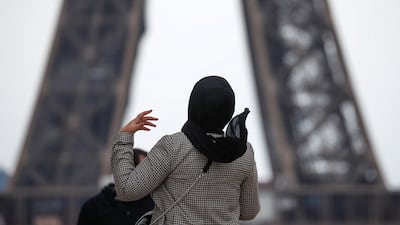France breached an international rights treaty when it barred a woman from wearing a headscarf while she studied at a school, the UN Human Rights Committee has said.
Naima Mezhoud, now 45, was due to train as a management assistant at a course held in a state secondary school where teenagers are prohibited by law from wearing the hijab.
She was on a professional training course for adults in 2010. She underwent an interview and entrance test.
But the headmaster of Langevin Wallon high school in the south-eastern suburbs of Paris refused to let her enter because of a ban on wearing religious symbols in public education establishments.
In 2004, France banned the wearing of hijabs and other religious symbols in state schools.
Preventing the woman from wearing a headscarf broke the International Covenant on Civil and Political Rights, the committee said.
It said that barring her from "participating in her continuing education course while wearing a headscarf constitutes a restriction on her freedom of religion in violation of the treaty".
The committee's decision was adopted in March but was sent to the woman's lawyer on Wednesday.
The French Interior Ministry and Foreign Ministry did not immediately respond to a request for comment.
The possible ramifications of the ruling were not immediately clear.
Freedom law expert Nicolas Hervieu, of the Paris Institute of Political Studies, said that according to legal precedent, it was unlikely that France would comply with the committee's decision.
The country is home to one of Europe’s largest Muslim minorities. For years, France has introduced laws designed to protect its strict form of secularism, known as “laicité,” which President Emmanuel Macron has said is under threat from Islamism.
Some Muslim associations and human rights groups have said those laws target Muslims, chip away at democratic protections and leave them vulnerable to abuse.
Ms Mezhoud approached the committee after she lost a series of appeals in French courts.
Her lawyer, Sefen Guez Guez, said the decision showed that international human rights institutions were critical of French policies regarding Islam.
"French institutions will have to comply with the UN decision," he said.
In theory, France now has six months to financially compensate Ms Mezhoud and offer her the opportunity to take the vocational course.
The country also must take steps to avoid similar breaches of international law in the future.


